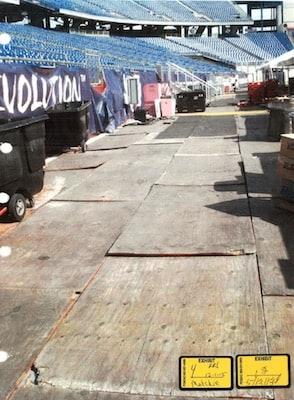Tenacious Advocacy
Outstanding Results

Some of the most serious injuries to persons in Massachusetts occur when person slip and fall due to dangerous conditions on the property of others. In such accidents, persons often fracture their ankles, hips, legs, arms or hands/feet, sustain traumatic head injuries and sometimes are killed. In Massachusetts, an owner or possessor of land owes a common-law duty of reasonable care to all persons lawfully on their premises. Davis v. Westwood Group, 420 Mass. 739, 743, 652 N.E.2d 567 (1995). This duty includes an obligation to maintain the property in a reasonably safe condition in view of all the circumstances, including the likelihood of injury to others, the seriousness of the injury, and the burden of avoiding the risk. Mounsey V. Ellard, 363 Mass. 693, 708, 297 N.E.2d 43 (1973).
One of the defenses property owners use to try to deprive persons in slip and fall accidents is known as the “open and obvious” defense. Here, the landowner claims that the dangerous condition was open and obvious to the injured person and therefore it is the injured person’s own fault that he/she was injured. Often, this defense is raised by landowners who have committed egregious examples of neglect for their property and for the safety of others.
It is critical for all to understand that because a dangerous condition is “open and obvious,” and even admitted to be so by an injured person, recovery is not barred against the property owner. In Massachusetts, landowners are not relieved of the duty to remedy an open and obvious danger “where the landowner can and should anticipate that the dangerous condition will cause physical harm to the lawful visitor notwithstanding that it’s a known open and obvious danger.” DOS Santos v. Coleta, 465 Mass. 148, 987 N.E.2d 1187 (Mass., 2013); Papadopoulos v. Target Corp., 457 Mass. 368, 379, 930 N.E.2d 142 (2010); Soederberg v. Concord Greene Condominium Association, 76 Mass.App.Ct. 333, 338, 921 N.E.2d 1020 (2010)(quotingRestatement (Second) of Torts at § 343A comment f); Davis v. Westwood Group, 420 Mass. 739, 743, 652 N.E.2d 567 (1995). An injured person may prove that a landowner’s reason to expect harm to lawful entrants from known or obvious dangers may arise where the landowner has reason to expect that:
The lawful entrant’s attention may be distracted, so that she/he will not discover what is obvious;
Thus, the doctrine of open and obvious danger does not mean that a defendant can maintain its property in an unreasonably safe condition as long as the unsafe condition is open and obvious. Id.; See also, Godsoe v. Maple Park Props., Inc., U.S. Dist. Ct. No. 06-10405-DPW, 2007 WL 2316468 (D. Mass. Aug. 9, 2007) quoting Martins v. Healy, Mass. Super. Ct., No. 005359, 2002, WL 1924882 (July 10, 2002) The prevalence with which lawful entrants encountering an open and obvious hazard believe it can be encountered safely is relevant. Id. Furthermore, the landowner need not have foreseen the precise manner in which the injuries occurred and has a duty to keep the property reasonably safe for lawful visitors regardless of the source of the danger. Id.; See also, Sheehan v. Roche Bros. Supermarket, Inc., 448 Mass. 780, 791-792 (2007)
The opportunity for success against the open and obvious defense extends even to injuries caused by snow and ice. Conceding that “it is hard to conceive of anything more universally known to be plainly liable to cause a person to slip than ice” and “even prior to the amendments to G.L. c. 231, 85 (comparative negligence statute)…, the Supreme Judicial Court had emphasized that whether a plaintiff’s own conduct in encountering an ice hazard should bar recovery was generally a question for the jury to decide.” Soederberg, supra. “This principle applied even where a plaintiff had options available to her…to have avoided the ice hazard. See Silver v. Cushner, 300 Mass. 583 (1938)” Id. “Our case law is replete with examples of people who, upon encountering snow or ice hazards, nevertheless continued to venture forward in the belief that they could do so safely if they proceeded with care.” Id. “These examples demonstrate that it is entirely foreseeable that people will engage snow and ice hazards….even if those hazards are open and obvious.” Id. “The reasonableness of the plaintiff encountering the hazard, despite it obviousness, may be considered by the jury insofar as it relates to the issue of comparative negligence…and is therefore a question of fact properly reserved for the trier of fact…” Id.
Massachusetts law therefore requires that if a jury finds that a defendant could and should have anticipated that a plaintiff was likely to encounter of an open and obvious condition despite its danger, the jury must decide “whether” the defendants were negligent and “whether” the plaintiff were negligent and the relevant percentages of fault of any parties found to be negligent.
When a landowner attempts to blame of lawful entrant for the landowner’s own negligence, or gross negligence, the injured person should be prepared to show that the hazard was “open and obvious” to the landowner, caused by the landowner, allowed to exist by the landowner, shows the landowners choice to take cheap alternatives to safety or to neglect it entirely for profit or due to indifference, and is under the control of the landowner who has the best opportunity and means to remedy it.